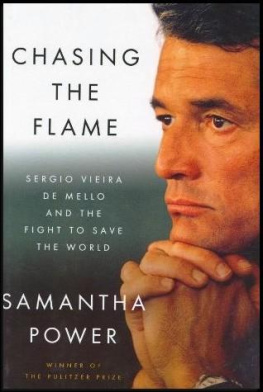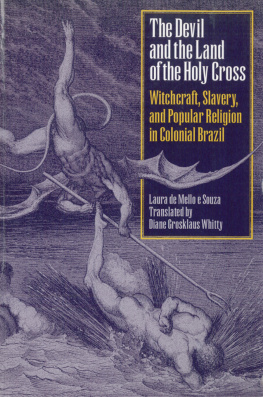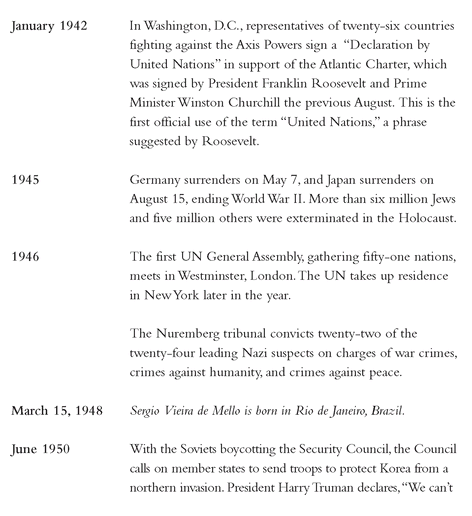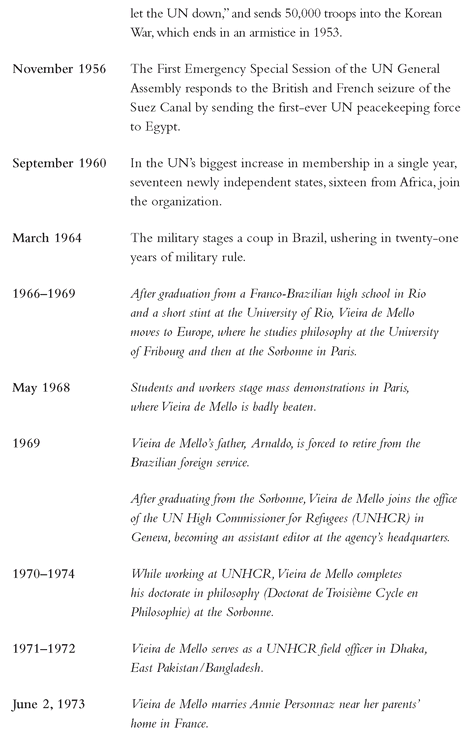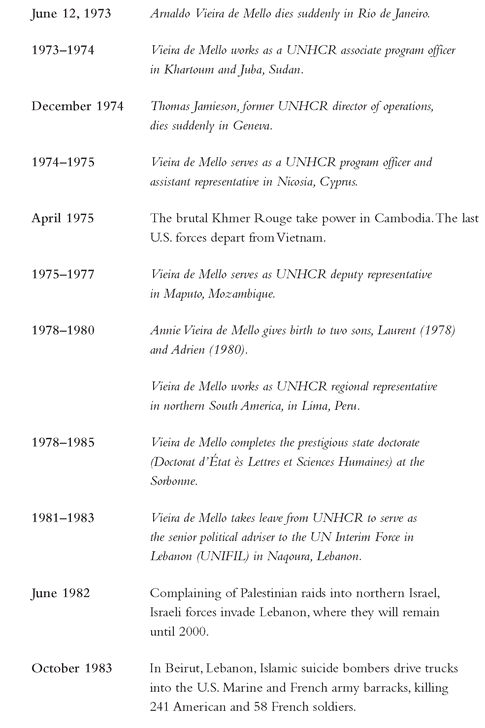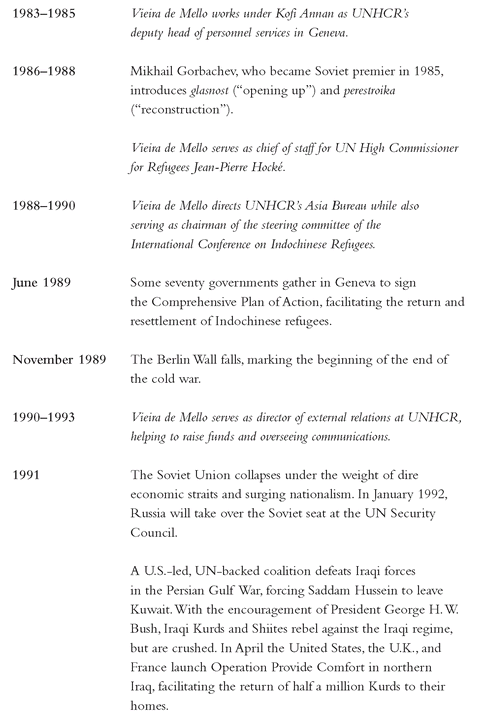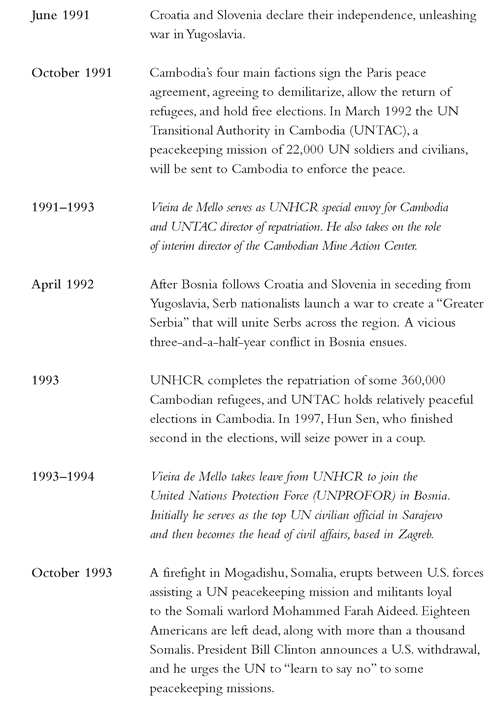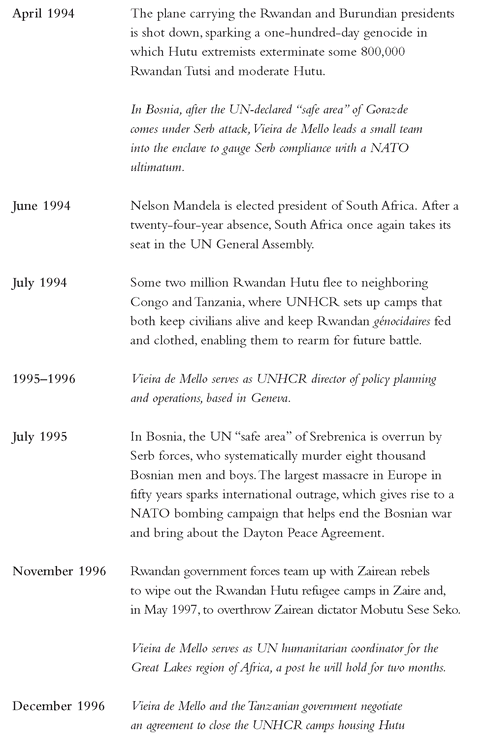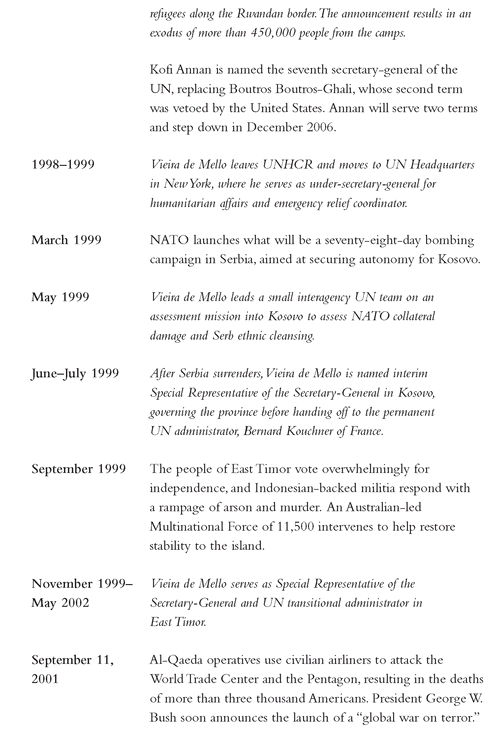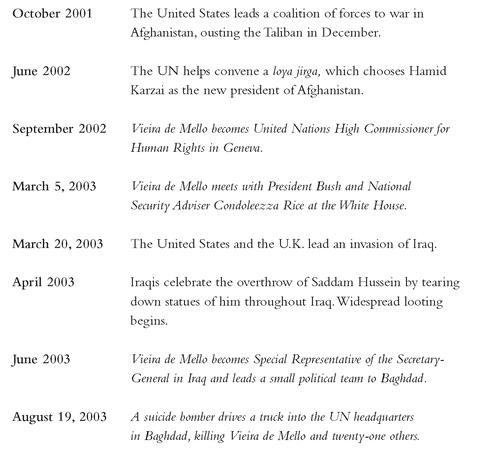Contents
Landmarks
Table of Contents
For Morton Abramowitz,
Stephen Power, and
Frederick Zollo
To access Penguin Readers Guides online, visit our Web sites at www.penguin.com or www.vpbookclub.com.
CHRONOLOGY
INTRODUCTION
At 8:45 a.m., on Tuesday, August 19, 2003, five months after the American-led invasion of Iraq, Sergio Vieira de Mello arrived by car at the headquarters of the United Nations in Baghdad. He had been unusually quiet on the drive over, and his bodyguards thought that he was showing signs of the strain of an ever less relevant UN presence and a collapsing security situation.
Having worked his entire adult life for the UN, Vieira de Mello, a fifty-f ive-year-old Brazilian, had plenty of experience with frustration. In his thirty-four years of service, he had moved with the headlines, working in Bangladesh, Sudan, Cyprus, Mozambique, Lebanon, Cambodia, Bosnia, Rwanda, Congo, Kosovo, and East Timor. He spoke Portuguese, English, French, Italian, and Spanish fluently and dabbled in several other languages. He had been rewarded for his talents with the toughest assignment of his career: UN envoy to Iraq.
He was suited for the job not because he knew Iraqhe didntbut because he had amassed so much experience working in violent places. He could perhaps show the Americans what to doand what not to do. He had long ago stopped believing that he brought the solutions to a places woes, but he had grown masterful at asking the questions that helped reveal constructive ideas.
Work had always been a place of refuge, and when he entered the UNs Baghdad base at the Canal Hotel he took the stairs up to his third-floor office, greeting staff members along the way. He spent the morning reading the latest cable traffic from UN Headquarters in New York and responding to e-mails.
In the late morning his security guards prepared a convoy to take him to the Green Zone, the fortified district where the American and British Coalition administrators had set up their base in Saddam Husseins abandoned palaces. He was scheduled to meet with L. Paul Bremer, the American administrator of Iraq, and a delegation of U.S. lawmakers from Washington.
By noon his armored sedan was ready to go, but just then Bremers office called. The flight bringing the U.S. congressional delegation to Baghdad from Kuwait had been delayed, and the lunch meeting would have to be canceled. He telephoned Carolina Larriera, his fiance, who was an economic officer in the mission. Ive been spared, he said. Do you want to grab a sandwich? Larriera said she couldnt because she had to send out invitations for an upcoming conference by 5 p.m. He told her he was counting the daysforty-two remainingbefore they would fly to Brazil for a months holiday.
UN officials had not expected to play a significant political role in Iraq. In the run-up to the war, the White House had scorned the UN, likening it to the ineffectual League of Nations. Vice President Dick Cheney had said that the UN had proven itself incapable of dealing with the threat that Saddam Hussein represents, incapable of enforcing its own resolutions, incapable of meeting the challenge we face in the twenty-first century.
But in the weeks following the toppling of Saddam Husseins statue in Baghdad, it had become clear that U.S. soldiers were going to need help. Suicide bombings had not yet begun, but widespread looting had, and those who had so easily dislodged the Iraqi dictator seemed increasingly lost when it came to managing the turbulent aftermath of his reign. European leaders who felt they had been snubbed back in March, when the United States and Britain had chosen to go to war, now agreed with Washington on one issue: Kofi Annan, the UN secretary-general, should deploy a team of specialists to help speed the day that Iraqis regained control of their country.
Vieira de Mello was chosen to head that team because of his vast experience, but also because a few weeks before the U.S. invasion of Iraq, he had done something few UN officials before him had managed: He charmed George W. Bush. In a meeting in the Oval Office, Vieira de Mello had criticized U.S. detention policies in Guantnamo and Afghanistan and pressed the president to renounce torture; yet Bush had warmed to him as a man. When the day came to choose an envoy, Annan appointed Vieira de Mello, believing he was the one man whose advice the Bush administration might heed. Annan also knew that his charismatic colleague was the rare troubleshooter who could secure the simultaneous backing of the American, European, and Arab governments.
During the eleven weeks he had spent in Iraq, Vieira de Mello had tried to find and expand the space where the UN could make a difference. Under Saddam Hussein, Sunnis had been the favored sect, but Vieira de Mello saw the danger of a new Shiite tyranny of the majority. He attempted to forestall it by pressing for the inclusion of Sunni leaders in the transition process and by enlisting the support of the leading Shiite clerics who were refusing to meet with Bremer. And he pressed Coalition officials to end their dependence on Ahmad Chalabi and other exiles who had a greater following in Washington than in Iraq.
But Bremer resisted implementing the UNs most important suggestions. Vieira de Mello had tried and failed to gain greater UN and Red Cross access to Iraqi detainees in U.S. custody. He had tried and failed to persuade Bremer to devise concrete timelines for a constitution, for elections, and for the exit of U.S. troops. And he had tried and failed to get the Coalition to rescind or scale back its two most destabilizing decreesthe wholesale de-Baathification of Iraqi institutions and the disbanding of the Iraqi army. By late July he had grown depressed. He told colleagues that Bremer and the Iraqis had stopped returning his phone calls.
Now, with two hours unexpectedly freed up, he returned to his cluttered to-do list. Up to then he had never publicly criticized the Coalitions excessive use of force, but he decided to change course, instructing an aide to draft a press release criticizing the Coalitions recent shooting of civilians. The more obstruction he met in Baghdad, the more his mind drifted forward to September 30, the day he would return to his full-time job in Geneva as UN High Commissioner for Human Rights. His time in Iraq had filled him with ideas about how to make a UN backwatera sponsor of costly reports and seminarsmatter in the lives of real people.




